commentary Commentary
Commentary: Can we ever cut our dependence on foreign domestic workers?
COVID-19 has led to changes in the supply of these women and this is a good time for us to confront a tough question about how we can cope with care-giving and a career, says Cherie Tseng.
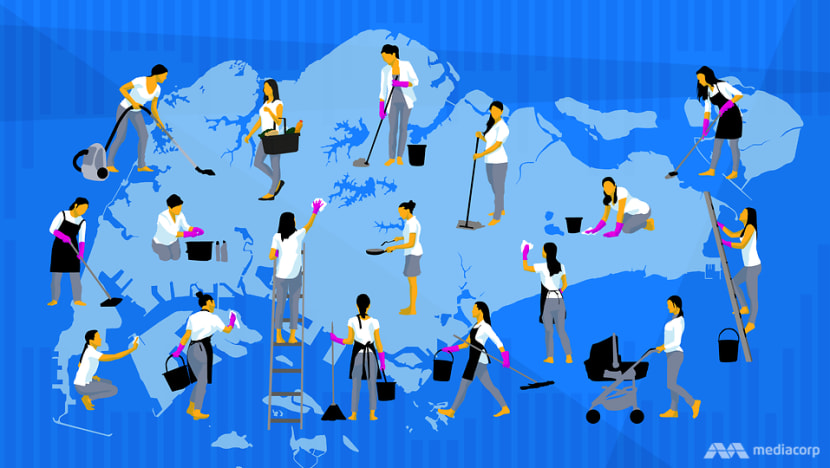
COVID-19 has made it tougher for households to hire a foreign domestic worker. (Illustration: Rafa Estrada)
SINGAPORE: As an island nation with few natural resources, we have long had an uncomfortable relationship with being reliant on others, on being dependent on another.
In our quest to be self-sufficient where water is concerned, we invest in next-generation water treatment processes and continually channel resources towards research and development to stay ahead of the game.
More recently, we are working on our food sustainability; a salient gap made visible this COVID-19 season.
The ongoing pandemic has tossed up a whole quarry of our shortfalls, and while it is on one hand, slightly disconcerting, it is also a timely opportunity for us to take a long, hard look at what is and what can be.
While water and food supply are essential, one group deserves our consideration: The almost quarter of a million Foreign Domestic Workers (FDWs) that live in our homes.
READ: Commentary: It should not be this hard to hire a foreign domestic worker
Back in the 1990s, only one in 13 families had helpers. Bringing in a helper took far more time, effort, money and paperwork. There were fewer options too, with most of them coming mainly from Philippines.
Today, one in five families have helpers, about 27 per cent, with the helpers coming from a wider selection of countries including Indonesia, Cambodia, Sri Lanka and Myanmar.
With a bigger pool, the cost of hiring a helper has also come down significantly with more competitive agent rates and a wider spread of expected salary to better suit a family’s income.
While a Filipino helper’s expected pay starts around S$570, a Myanmar helper’s salary is lower, other general living expenses notwithstanding.
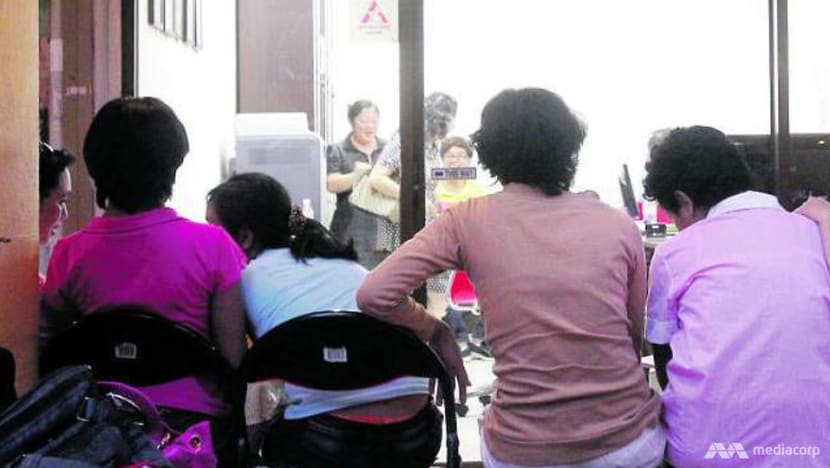
In these many years, as more of them arrived and more of us hired them, the profile of home-owners with helpers shifted too – no longer a luxury of the wealthy but families with more modest means also had live-in help.
So much so that getting a helper feels like a rite of passage for most dual-income couples that become dual-income families.
When a baby comes into the picture – a helper is an automatic option. One only needs to go hang out at a mall on the weekends to see how many families have helpers in tow.
HIRING FDWS IN A TIME OF CORONA(VIRUS)
The discussion about our nation’s reliance on Foreign Domestic Workers (FDW) has been bubbling away in the surface for some time. One camp extols the merits of providing jobs for these women, and the other admitting — albeit grudgingly, that we quite like the convenience that having a live-in helper provides.
Critics point to the generation of children raised by FDWs who clean up after them and become so used to having someone else take care of their environment, they barely know how to do simple chores.
Slowly however, this convenience is beginning to cost us more. Because of the pandemic, there has been a dip in the number of FDWs able to come in, at one stage, none due to closed borders locally and regionally.
READ: Demand for new maids high despite extra costs amid COVID-19 restrictions, risk of imported cases
There are also new COVID-19 related costs. It is compulsory for employers to buy medical insurance purchased prior to the helper arriving to Singapore, with coverage of at least S$10,000 for the FDW’s medical coverage in case she develops COVID-19 symptoms.
This, in addition to the FDWs still needing to serve 14 days in quarantine, the cost borne by the employer with additional risks should they be tested positive.
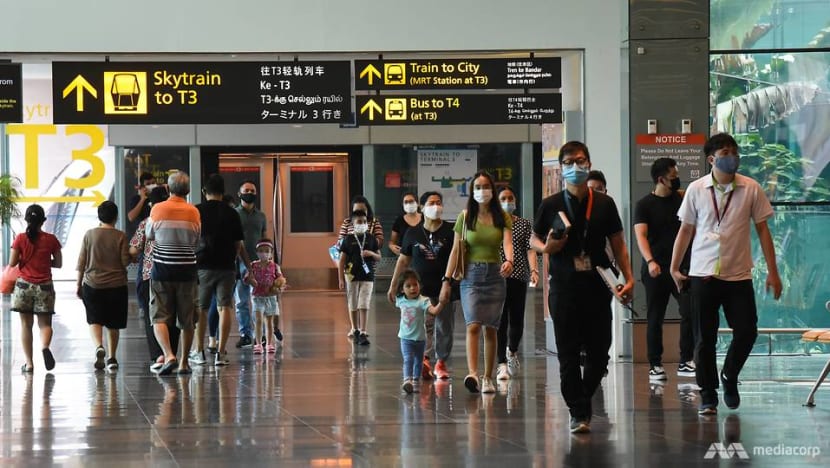
There are also new rulings that are set to come into play: The Indonesian authorities have made it a rule to pass the cost of Indonesian FDW placement fees, which covers transportation, medical checks and accommodation, from the helper to the employer making it about S$3,000 more expensive to hire an Indonesian helper.
This amount was previously clawed back from the helper’s salary.
Layering on the dismal global outlook, one would expect that we would be hiring less helpers. One less helper in the home would surely amount to significant savings, no?
And think of all the opportunities families would have in a maidless home to engage the children in meaningful things like household chores.
READ: Commentary: Can young working parents survive without a maid?
While there might have been an uptake in robot vacuums in the wake of the pandemic, we have not quite seen the drop in families that hire helpers as some would expect. In fact, the demand seems to have held steady, if not even elevated.
“As COVID-19 unfolded, we braced for a glut in the market only to find that the demand for FDWs have remained steady for us, even increased. The closed borders made it hard to bring in new helpers but we were still able to do well in the transfer-maid segment,” said Ms Irene Ang, co-owner of Femme5 Agency, a relatively new kid on the block that have seen their business remain steady.
READ: Commentary: Why a respectful relationship between foreign domestic workers and employers is in everyone’s interest
But she is seeing changes – experienced helpers are more selective in who they want to work for. With news reports suggesting 20 potential employers to each available transfer FDW, simple economics is beginning to kick in – demand is outstripping supply.
A mother of three interviewed by the media said: “It has been frustrating (not being able to hire a helper). We have not had a maid for about 10months and I have had to turn down a job offer to take care of my children and mother.”
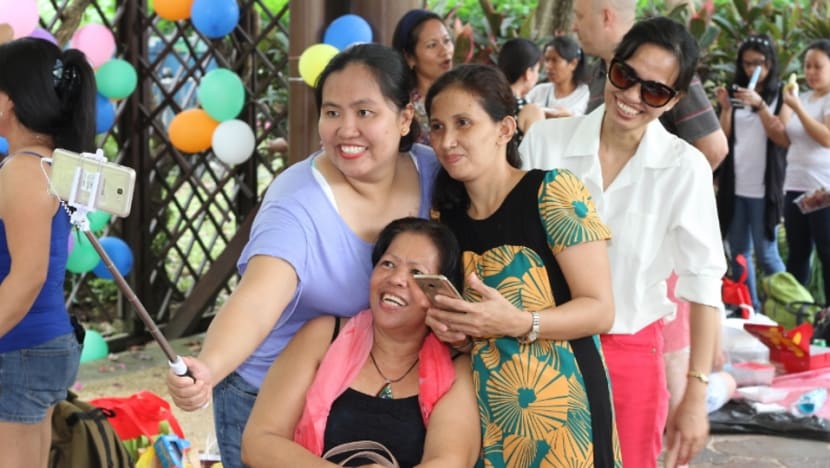
It is no secret that, across the world, this pandemic and consequent recession is hurting women workers—working mothers especially when you add children, the shift to remote schooling and the changes in childcare setups.
The New York Times calls this the “special burden” that working mothers face, they who are already grasping with job security, on top of juggling home and family demands.
RETHINKING THE RELIANCE
So perhaps this is a good time as any to rethink this reliance we have. It is logical that if we depend so much on one thing, then if the tap is suddenly “switched off” so to speak, it will leave us completely vulnerable.
For me, this is an uncomfortable reality – because much of my ability to be successful at home and at work is largely because I have a domestic manager who tends to housekeeping and the multiple municipal matters in between.
We cannot take a look at the "Us vs FDWs" dynamic without seeing it against the complex societal tapestry we find ourselves in. The idea that any parent should be able to successfully keep house, manage kids, their school work and their marriage with their mental wellness intact is downright unrealistic.
READ: Commentary: Singlish, food, chats with Toa Payoh Hokkien mee owners - things Singaporeans miss when stuck overseas
Ms Sher-Li Torrey, founder of Mums@Work, a social enterprise that specialises in flexi-job placements for mothers knows this first hand. She says for full-time working mothers, an FDW “helps to free up time for the mother to take on more parenting duties such as supervision of schoolwork, as their time at home with their children is limited.’’
In other words, we have come to point where having an FDW is a lifeline – especially when gender-parity at home is still a work-in-progress in Singapore.
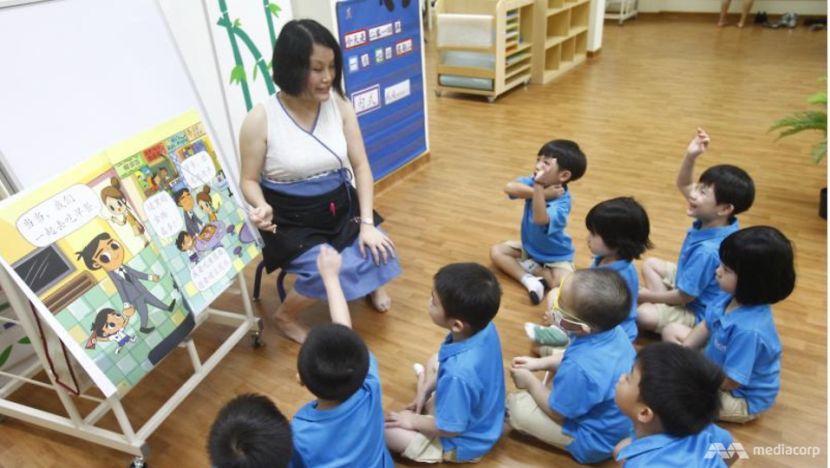
But perhaps, we can look at how COVID-19 has shifted the needle, ever so slightly. One knot that has been untied is how flexi-work arrangements has been embraced so widely.
Ms Torrey says as more parents (not just mums) are able to work from home, she is seeing more mothers toy with the idea of not having an FDW. “Many of them now have more flexibility to arrange their schedule to free up more time,” she says.
READ: Commentary: 'Super mums' have one simple request. Don’t hinder them from returning to work
While that’s a promising sign, we are not going to find an easy solution overnight and our weaning period will take not just time but some serious structural and mindset changes.
As a nation, we still clock some of the longest work hours in the world, we have limited eldercare options and continue the belief that we are a clean nation instead of a cleaned nation.
We need to face some truths – that we depend on low-wage workers to clean up after us and this extends from our roads to our hawker centres to our homes.
Yes, inter-dependence gives these migrant women a chance to provide for their own children but we should be honest enough to admit we have come to depend on them to raise ours.
Listen to activists involved in foreign domestic workers' affairs discuss the challenges in drawing a line on what FDWs can and cannot do on CNA's Heart of the Matter podcast:
Cherie Tseng is Chief Operations Officer at a local fintech company, a mother of three and editor with The Birthday Collective.














